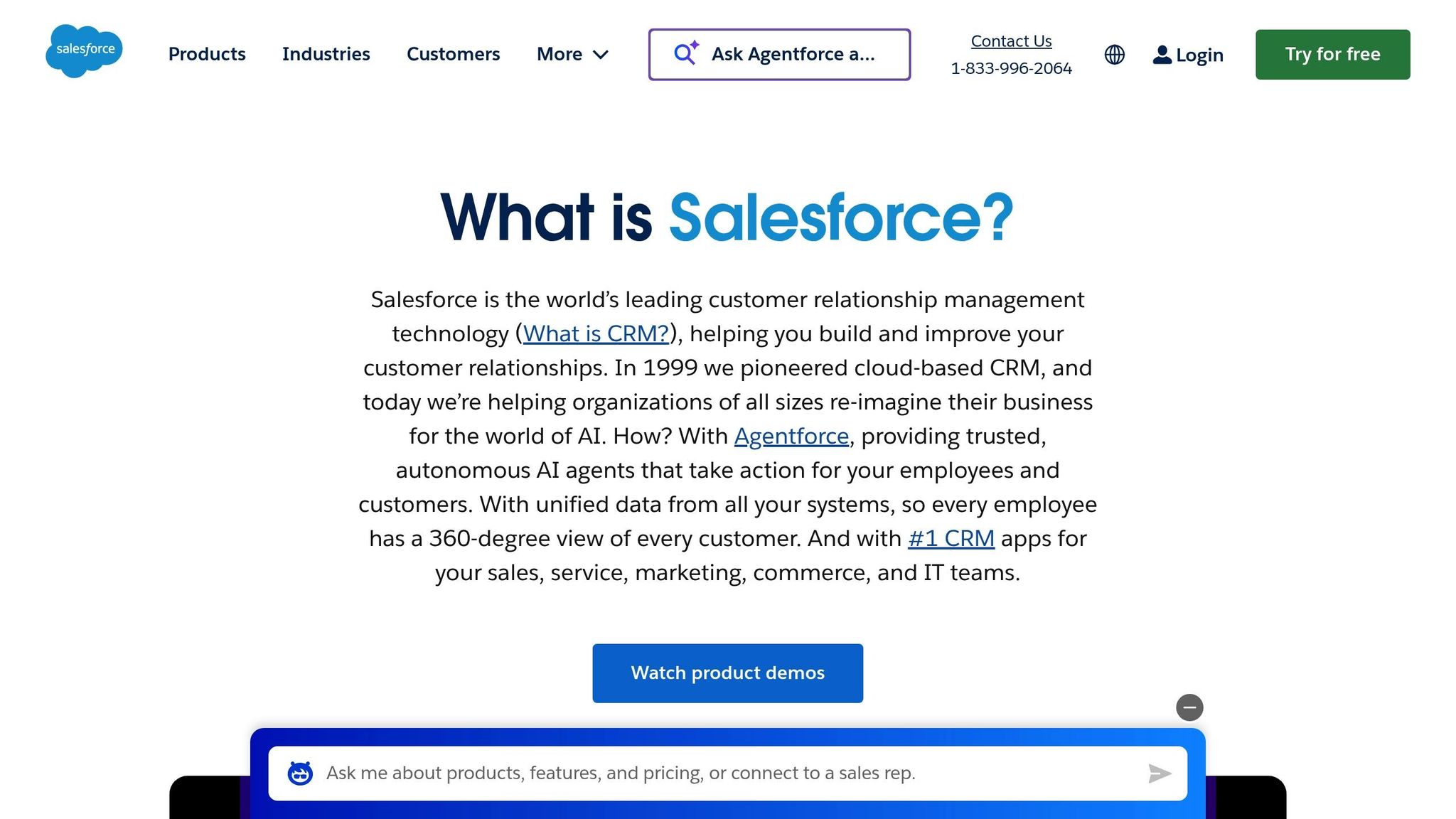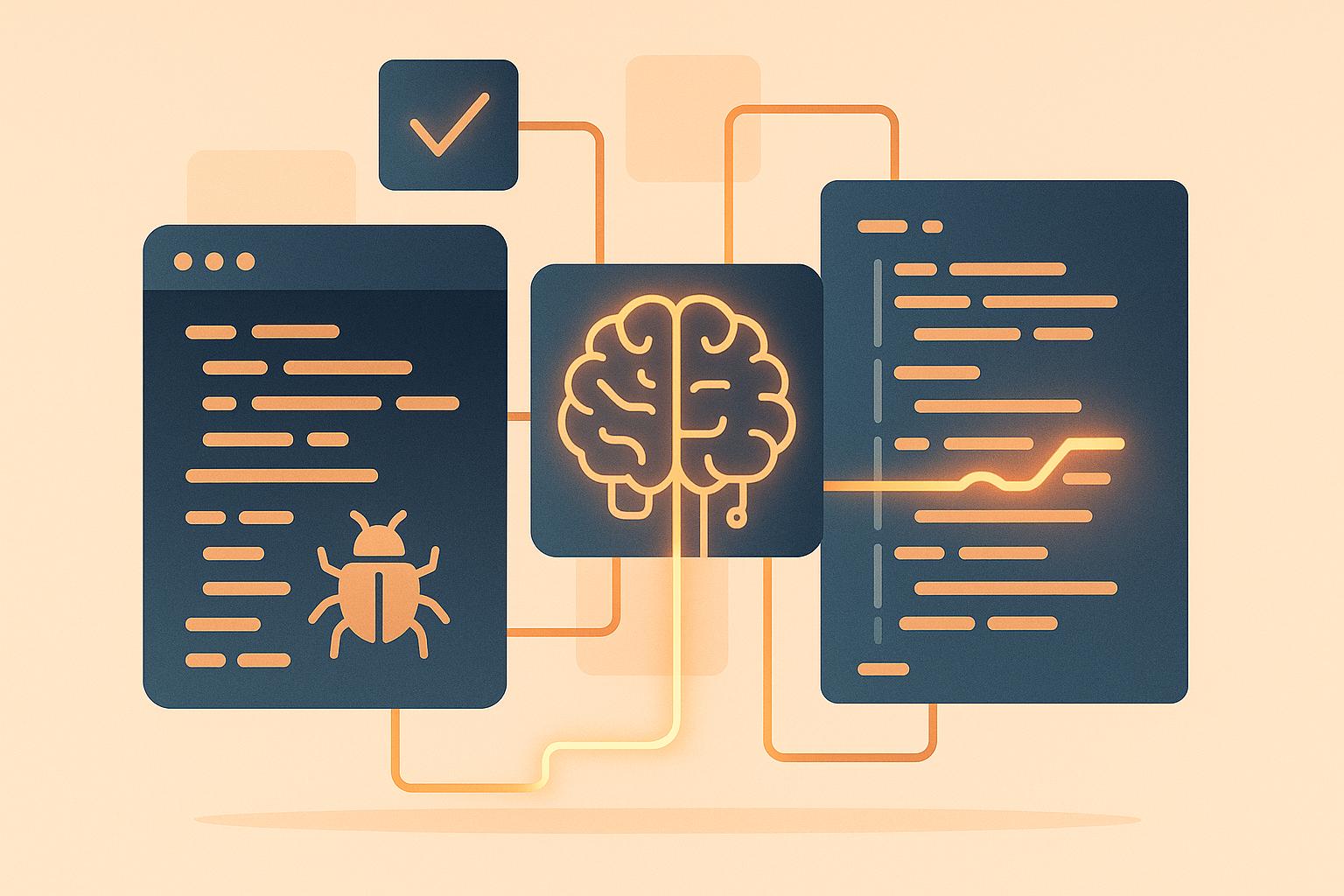
AI in CRM for Virtual Healthcare: Benefits | Digital Fractal
AI-powered CRM systems are transforming virtual healthcare in Canada by addressing key challenges like administrative inefficiencies, fragmented data, and low patient engagement. Here’s how these systems are making an impact:
- Automation: Tasks like scheduling, billing, and follow-ups are automated, reducing staff workload and errors. For example, automated reminders can cut no-show rates by up to 36%.
- Predictive Analytics: AI analyses patient data to detect early health risks, enabling timely interventions. Remote monitoring has shown to reduce emergency hospital admissions by 20% for chronic conditions.
- Personalized Care: Individualized care plans based on clinical history and lifestyle improve treatment adherence and satisfaction.
- Patient Engagement: AI chatbots provide 24/7 support, helping patients book appointments, receive reminders, and access health advice in English or French.
- Data Integration: Systems securely consolidate patient records, ensuring real-time access across healthcare providers while complying with Canadian privacy laws.
These advancements improve patient outcomes, streamline operations, and enhance access to care, particularly in remote or underserved areas. Companies like Digital Fractal Technologies Inc. specialize in delivering tailored AI solutions for Canadian healthcare providers.
How to Use AI and Health Cloud to Improve Patient Care | Salesforce Explained

Predictive Analytics: Better Patient Outcomes
AI-powered predictive analytics is reshaping how virtual healthcare providers in Canada approach patient care. By analysing vast amounts of data, including medical histories and real-time information from wearable devices, these systems can uncover patterns that signal potential health issues before they become critical. This forward-thinking approach not only enhances patient outcomes but also alleviates strain on Canada’s healthcare system by encouraging early intervention and smarter risk management.
These systems draw from a variety of sources, such as electronic health records, wearable health monitors, medication adherence logs, and patient-reported outcomes. When combined with provincial health records and designed to comply with privacy laws, they deliver powerful insights while maintaining secure and ethical data practices.
Early Health Risk Detection
AI algorithms excel at identifying subtle changes in data that may indicate developing health problems. For virtual healthcare providers, this translates into real-time alerts when patients show early warning signs – like unusual vital signs or missed doses of medication – allowing providers to step in before the situation worsens.
This capability is especially impactful in managing chronic conditions and reducing the need for acute care. For example, studies have shown that AI-enabled remote monitoring can cut emergency hospital admissions by up to 20% in populations with chronic diseases. In Canada, where many patients live in remote or underserved areas, this type of continuous monitoring can close the gap between distance and quality care by catching potential crises early.
By moving from reactive to proactive care, AI-powered systems enable healthcare providers to address concerns flagged by predictive models – helping prevent minor issues from escalating into major health events.
Personalized Care Plans
Predictive analytics doesn’t stop at early detection; it also brings a new level of precision to treatment. These AI systems create highly individualized care plans based on a patient’s clinical history, genetic profile, and lifestyle. By suggesting targeted medication adjustments and lifestyle changes, they improve treatment adherence and patient satisfaction, addressing each person’s unique needs.
For instance, a major Canadian hospital network used an AI-driven system to identify high-risk patients. By implementing tailored interventions, they significantly reduced readmission rates. This approach has shown similar promise across Canada’s healthcare system, particularly in enhancing chronic disease management and preventing unnecessary hospital visits.
AI also supports personalized care through automated reminders and follow-ups. These tools identify patients who may struggle with medication adherence and deliver timely interventions, ensuring better long-term health outcomes.
Digital Fractal Technologies Inc. is at the forefront of bringing these advancements to Canada’s healthcare providers. Their expertise in AI consulting and custom CRM development – spanning applications like Mental Health Case Management Apps and Health & Wellness Management Apps – helps organizations deploy AI systems that improve patient outcomes while adhering to Canadian regulatory standards.
Workflow Automation: Better Operations
AI-driven workflow automation is reshaping how Canadian virtual healthcare organizations operate, boosting efficiency and reducing errors that could affect both patient care and budgets. By leveraging advanced CRM systems, these organizations are streamlining daily tasks, ultimately transforming how care is delivered.
The benefits go beyond simply completing tasks faster. Reducing administrative burdens frees up healthcare professionals to focus more on patient interactions and clinical decision-making. This shift is especially crucial in Canada, where healthcare providers face staffing shortages and rising patient demands, creating ongoing operational challenges.
Automated Administrative Tasks
AI-powered CRM systems handle a broad range of administrative tasks that traditionally required significant staff time. For instance, appointment scheduling becomes far more efficient with algorithms that match provider availability, patient preferences, and clinical needs. These systems also send automated reminders via SMS or email, which can reduce no-show rates by up to 36% in healthcare settings.
Billing processes also see major improvements. AI systems can generate invoices, track payments, and verify insurance details automatically, cutting down on errors and speeding up revenue cycles. This is a critical advantage for healthcare organizations looking to improve their financial health.
Data entry, often a time-consuming and error-prone task, is streamlined through automation, eliminating duplicate entries and transcription errors. AI-powered chatbots are another game-changer, managing up to 80% of routine patient inquiries. These bots provide instant answers to common questions about appointments, billing, and basic health information, freeing up staff for more complex tasks.
Pre-authorization and insurance verification processes also benefit from automation. AI systems can quickly confirm coverage, process pre-approvals, and flag potential issues, reducing scheduling conflicts and administrative delays.
Patient communication is enhanced through automated follow-ups, treatment reminders, and personalized health education materials. These tools ensure that patients receive timely, consistent information, contributing to better health outcomes while improving operational efficiency.
Cost Savings and Productivity Gains
The financial impact of workflow automation in Canadian healthcare is hard to ignore. Many organizations see immediate reductions in overtime costs as staff no longer need to work extended hours on tasks that automation can handle.
By automating routine processes, healthcare organizations can reassign staff to patient-facing roles, which leads to improved patient satisfaction and better clinical outcomes. Reducing errors also translates to significant cost savings. For example, one clinic that adopted AI-powered chatbots in its CRM system saw a 30% reduction in administrative workload and a 15% increase in patient satisfaction within six months.
Automation also enables smarter resource allocation. AI systems provide real-time insights into operational trends, helping organizations identify peak demand periods, optimize staff schedules, and reduce waste in supplies and equipment. Over time, these efficiencies lead to sustainable improvements that benefit both financial performance and the quality of patient care. The savings generated can be reinvested into further innovations that directly benefit patients.
For Canadian healthcare organizations looking to implement these solutions, Digital Fractal Technologies Inc. offers tailored expertise. Their custom CRM systems and workflow automation tools are built specifically for the Canadian healthcare landscape, ensuring compliance with local regulations while maximizing efficiency. With their experience in AI-driven technologies, they guide organizations through every step – from initial assessment to full deployment and ongoing optimization.
sbb-itb-fd1fcab
Patient Engagement: Better Access and Satisfaction
AI-powered CRM systems are doing more than just streamlining healthcare operations – they’re reshaping how patients interact with their providers, making healthcare more accessible and satisfying. These advanced platforms break down barriers, creating direct and efficient connections between patients and healthcare professionals, which is especially impactful in virtual care settings.
In Canada, where access to healthcare can sometimes be challenging, these tools provide immediate, personalized support. This ensures patients feel guided and confident throughout their healthcare journey, no matter where they are.
AI Chatbots for Virtual Support
AI chatbots have become the go-to solution for improving patient engagement, offering round-the-clock support. These virtual assistants handle tasks like scheduling appointments, sending medication reminders, and answering common health questions. The result? A smoother, more convenient experience for patients across Canada. Whether it’s booking an appointment at midnight or getting health advice in either English or French, these chatbots cater to Canadian standards.
Healthcare providers also gain from this automation. By delegating routine inquiries to chatbots, staff can focus on more complex and urgent patient needs, effectively reducing their administrative burden.
Access for Rural and Underserved Areas
For rural and remote communities in Canada, AI-powered CRM systems are a game-changer. Virtual consultations and remote monitoring mean that patients in areas like northern Ontario or remote parts of British Columbia can access specialist care without having to travel long distances. These systems maintain continuous engagement through automated follow-ups, ensuring minor health issues are addressed before they become serious.
This technology also plays a critical role in levelling the healthcare playing field. Patients in underserved regions receive the same quality of care coordination, treatment reminders, and health education as those in urban centres. This focus on equity ensures that everyone, regardless of location, has access to consistent and reliable healthcare.
Digital Fractal Technologies Inc., an Alberta-based company, has been instrumental in addressing these challenges. Their healthcare applications are designed specifically for Canadian needs, seamlessly integrating with existing systems while considering the unique demands of rural and remote care. With a deep understanding of Canada’s geography and communities, their solutions ensure AI-powered tools work effectively across diverse populations.
Healthcare organizations using these AI-driven tools report tangible benefits, including higher patient engagement, better adherence to treatment plans, and fewer no-shows for virtual appointments. These advancements not only improve patient outcomes but also make better use of healthcare resources, a crucial factor in managing Canada’s vast and varied healthcare landscape.
Data-Driven Decisions for Continuous Improvement
AI-powered CRM systems go beyond storing information – they turn raw data into practical insights that help healthcare providers make informed, evidence-based decisions. These systems analyse patterns, predict outcomes, and support continuous improvements in both care quality and operational efficiency.
In Canada, with its mix of bustling urban centres like Toronto and remote areas such as Nunavut, data-driven decision-making plays a critical role. AI-based CRM platforms allow healthcare providers to navigate complex patient data while adhering to Canadian privacy laws and healthcare regulations. By complementing earlier advancements like workflow automation and personalized care, these tools help maintain a cycle of ongoing improvement.
Data Collection and Insights
The ability to collect and interpret data is at the heart of these systems. AI-powered CRMs gather patient information from diverse sources, including electronic health records, patient portals, wearable tech, telehealth services, and even administrative interactions. Machine learning then uncovers patterns and identifies risks, enabling timely interventions.
These insights help healthcare providers address critical issues, such as overdue preventive screenings or early signs of medical decline. For instance, analytics might show that tailored communication – whether through text messages or phone calls – can significantly boost patient engagement across different age groups or demographics.
Risk stratification is another game-changer. A U.S. hospital network used a CRM system to pinpoint patients at high risk of readmission. By implementing personalized follow-ups and coordinated care plans, the hospital cut its readmission rates by 20% within a year. Similarly, clinics using AI-driven scheduling and reminder tools have seen a 30% drop in missed appointments.
Natural language processing (NLP) adds even more value by extracting key insights from clinical notes. This enables healthcare teams to make well-rounded, evidence-based decisions that consider a patient’s complete health history.
Digital Fractal Technologies Inc. stands out in this field. Their expertise in data engineering and machine learning has led to the development of healthcare-focused tools like Mental Health Case Management Apps and Health & Wellness Management Apps. These applications not only streamline data collection and analysis but also uphold the data sovereignty essential for Canadian healthcare providers.
Integration with Canadian Health Records
AI-powered CRM platforms are designed to integrate seamlessly with Canadian health record systems. They work within provincial frameworks – such as Ontario’s Electronic Health Record and Alberta Netcare – by adhering to HL7 and FHIR standards.
This integration allows real-time access to patient data across different healthcare settings. For example, a family doctor in Vancouver can review a specialist’s notes from Calgary, or a telehealth provider can check lab results ordered elsewhere. All of this happens while maintaining strict compliance with PIPEDA and provincial health information laws.
Security and privacy compliance are non-negotiable. These systems use end-to-end encryption and multi-factor authentication to protect sensitive patient data. Regular security audits and third-party certifications further build trust in managing healthcare information.
Healthcare providers can also track performance metrics like patient satisfaction, appointment adherence, readmission rates, and treatment outcomes. This helps identify areas for improvement and measure the success of interventions.
The integration doesn’t stop there. AI-driven predictive analytics can forecast issues like treatment adherence and disease progression well in advance. For instance, machine learning models integrated with CRM systems have been shown to predict the progression of diabetes months earlier than traditional methods, enabling preventive care that reduces complications.
Digital Fractal Technologies Inc. delivers tailored integration solutions that enhance existing healthcare systems without disrupting workflows. Their focus on workflow automation and AI integration ensures that these platforms fit seamlessly into current operations while respecting Canada’s data sovereignty requirements.
Integrated CRM systems also offer faster response times. Healthcare organizations report receiving actionable alerts hours earlier than traditional methods, which is especially crucial in Canada’s vast and often remote regions. Timely interventions can make all the difference in improving patient outcomes and reducing adverse events. These integrated tools not only enhance patient care but also boost operational efficiency across the country.
Conclusion: AI CRM Impact on Canadian Virtual Healthcare
AI-powered CRM systems are reshaping virtual healthcare in Canada, delivering tangible improvements in patient care, operational workflows, and accessibility. These systems bring value through predictive analytics that support early interventions, workflow automation that eases administrative tasks, and round-the-clock AI-driven support that fosters better patient engagement.
Healthcare organizations adopting these technologies have reported reduced hospital readmission rates, higher patient satisfaction, and more efficient operations. This allows healthcare professionals to dedicate more time to complex cases rather than routine tasks. For providers across Canada, from bustling urban hubs like Montreal to remote areas in the Northwest Territories, these systems help close critical gaps in care delivery and resource management.
Another major advantage is cost savings. AI CRM systems integrate seamlessly while adhering to Canadian regulatory standards, offering real-time data sharing across healthcare settings. This ensures better care coordination, supports evidence-based decisions, and strengthens continuity of care across the country.
To fully leverage these benefits, expert guidance is crucial. Digital Fractal Technologies Inc. specializes in creating custom CRM systems and providing AI consulting tailored to the unique needs of Canadian healthcare. Their expertise in developing solutions like Mental Health Case Management Apps and Health & Wellness Management Apps highlights their ability to address both technical and regulatory challenges faced by healthcare providers in Canada.
FAQs
How do AI-powered CRM systems protect patient data while complying with Canadian privacy laws?
AI-powered CRM systems in virtual healthcare come equipped with strong security features to safeguard patient data while adhering to Canadian privacy laws, including the Personal Information Protection and Electronic Documents Act (PIPEDA). These systems rely on advanced encryption, secure authentication methods, and routine audits to protect sensitive information.
On top of that, AI-driven CRMs streamline compliance processes by tracking data access, keeping comprehensive logs, and ensuring that only authorized individuals can view or alter patient records. By leveraging these technologies, healthcare providers can uphold privacy and security standards, fostering trust with patients.
How can AI-powered CRM systems address healthcare challenges in rural and remote areas of Canada?
AI-powered CRM systems have the potential to address some of the key healthcare challenges faced by rural and remote communities in Canada. By using predictive analytics, these systems can pinpoint potential health risks and help prioritize care for individuals who may struggle to access medical facilities. This allows for timely interventions and ensures healthcare resources are used more effectively.
On top of that, AI-driven automation can take over time-consuming administrative tasks, such as scheduling appointments and managing follow-ups. This not only lightens the workload for healthcare providers but also boosts patient engagement. Virtual healthcare platforms enhanced with AI further improve communication between patients and medical professionals, breaking down geographical barriers and making healthcare more accessible for underserved areas.
How can predictive analytics in AI-powered CRM systems help manage chronic diseases and reduce hospital readmissions?
Predictive analytics in AI-driven CRM systems offers healthcare providers a powerful tool to spot patterns in patient data, paving the way for early detection of potential health concerns. By examining elements like medical history, lifestyle habits, and how well patients stick to treatment plans, these systems can anticipate risks and suggest proactive measures.
This capability plays a key role in managing chronic diseases more effectively. It allows healthcare professionals to create personalized care plans and schedule timely follow-ups, helping to prevent complications. On top of that, it cuts down on hospital readmissions by ensuring patients receive appropriate care when they need it. The result? Better health outcomes for patients and lower overall healthcare costs.

